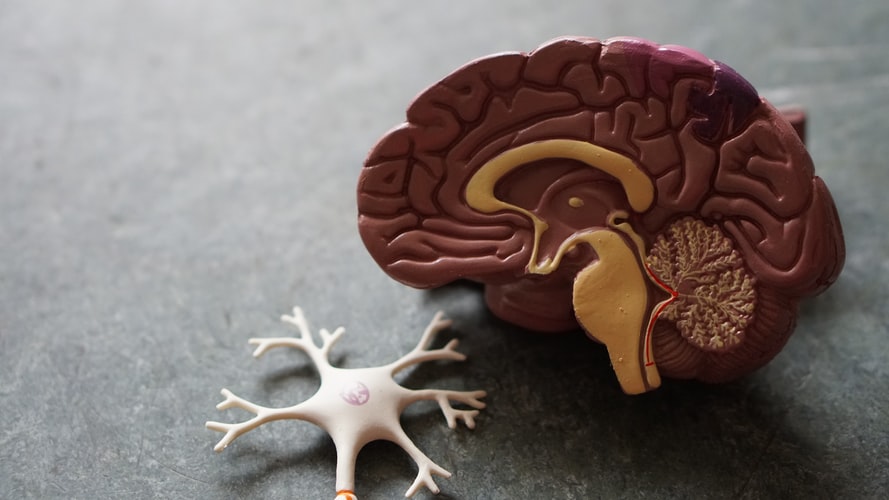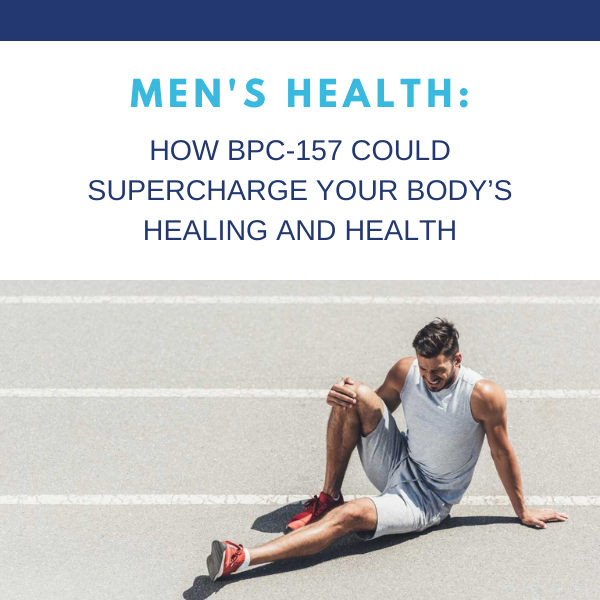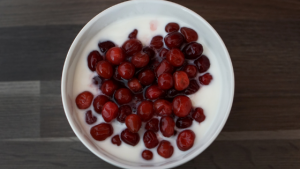
I’m getting really excited about peptides.
It’s not just me: the general medical community is coming to understand—if slowly— what a small group of dedicated researchers have known for decades: peptides may be the key to aging gracefully.
They’re promising for a few reasons.
The first—and most important—is that they actually seem to work. Unlike many fads in the men’s health and precision medicine space, peptides are walking the talk.
The second is that they work by using your body’s own biology. Rather than introducing a harsh chemical to your system and hoping for the best, peptides are already used by your body to regulate itself. So they fit well in our body’s complex machinery.
And the third reason is that there are so many. There are thousands of peptides known to science, and only a handful have been truly and properly studied. Different peptides have very different effects. There’s a ton of promise.
This article is about one peptide in particular that is widely used in athletics and by biohackers. It’s called “gastric pentadecapeptide body protection compound” but is more commonly known as BPC-157—“body protection compound”.
While we’re still learning more about it, the evidence indicates it could be used to greatly boost recovery from injuries, help heal stomach ulcers, and have a number of other protective effects.
What is BPC-157?
BPC is a peptide, which means it’s a short chain of amino acids—the substances that make up proteins. It’s a pentadecapeptide, which means that it’s made up of 15 amino acids held together by peptide bonds.
BPC is considered a “synthetic” peptide because this particular substance is created synthetically in a lab. But it was derived from a protein that is found in the human body. BPC, chemically, looks like a smaller part of that natural protein.
Peptides are often used by our bodies as chemical messengers. They help regulate a number of different functions and get the body performing at its best.
Because they’re naturally used by our body, supplementing peptides has become an effective therapeutic technique. The peptide therapies that exist can be used for a number of beneficial uses including to boost the immune system, to help with weight loss and burning fat, and even to reduce inflammation.
What does BPC-157 do?
Well, it appears that it has a number of potential benefits, especially when it comes to helping your body heal and repair after an injury.
BPC-157 speeds up tissue repair

Some of the promising studies on BPC-157 have found that they may be effective in speeding up the repair of ligaments, tendons, muscle tissue, and even the skin.
For example, in one study, BPC-157 consistently healed damaged ligaments in rats much quicker than if it was not present. The healing was effective, too: it preserved the function and biomechanics of the joint. In another study, BPC-157 was found to kickstart the production of collagen. Collagen helps skin look elastic, and is also essential to joint health, as well as hair and nails. In a further study, BPC sped up bone repair.
Those results seem to hold across studies. In a 2019 review, researchers found that BPC-157 was consistently able to repair soft tissue injuries across all the research that they reviewed. They noted,
“All of the studies to date that have tested BPC 157 as a treatment therapy have demonstrated extremely positive healing effects for various injury types in a number of soft tissues.”
I should note an important caveat to this research: most of the studies that have been done on this peptide have been done on animals—usually rats. That’s normal: animal studies are used to get a sense of what a compound does and to get a sense of its safety. That’s partly so that humans are not put at risk, but it’s also because research on animals is much less expensive to do. Then researchers move to humans so they are confident that it could work and when they are willing to invest in much more expensive research.
Since rats have a lot in common with humans, including how our muscles and lean tissues work, the research results for BPC-157 are quite promising.
But of course, since most of the research hasn’t been conducted on humans, we need to be cautious about making too much of these findings.
BPC-157 helps heal your gut
One of the focuses of BPC-157 research is on its role in contributing to gut health. This is the focus mostly because BPC-157 was originally derived from a protein that is found in the gut.
Research now suggests that it can have a powerful effect on protecting and healing damaged digestive tissue: it’s been found to inhibit the formation of lesions in the esophagus, stomach, and duodenum. This is especially true of the oral form of BPC-157, which is especially good for the gut.
BPC-157 route of administration
BPC-157 can be taken orally or it can be injected subcutaneously (just beneath the skin). It appears to have the most powerful effect on gut health when taken orally, whereas subcutaneous injections are better for reducing systemic inflammation and aiding with tissue repair. BPC-157 can be injected subcutaneously in the lower abdomen, or for better effect in specific joints or muscles, can be injected near the site of concern (for example, you might inject it near the elbow if you wanted to heal an elbow injury).
BPC-157 reduces harmful side effects of other medications
It can also help protect the gut from other chemicals.
The magic of modern medicine has given us a number of important pharmacological interventions (medications) for a wide range of diseases and medical issues. These are often essential.
But they also may have some harmful side effects.
For example, haloperidol is a commonly used medication for treating the symptoms of some psychological illnesses like mania and schizophrenia. It’s a very useful drug, but it can also be quite rough on the body. One side effect of haloperidol is that it causes stomach lesions. Stomach lesions are also a side effect of some chemotherapy medications that are used to treat cancer.
BPC-157 seems to be able to counteract these in many cases, preventing these lesions. That suggests it could be useful as a complementary therapy when these other medications are prescribed.
BCP-157 enhances blood flow
Doctors and scientists suspect that one of the ways BPC works to repair tissue is by increasing blood flow to injuries. After all, blood brings the body what it needs to repair itself: oxygen, nutrients, antibodies, and so on.
And BPC-157 seems to increase blood flow. There appear to be two ways that it does so.
The first is by upregulating the expression of growth factor early growth response gene-1 (also called EGR-1). This gene is involved in increasing the amount of blood that flows to wounds.
The second way it does this is by actually increasing the number of blood vessels. The fancy medical terms are angiogenesis (the creation of arteries) and vasculogenesis (the creation of veins). BPC-157 seems to activate vascular endothelial growth factor receptors, which are involved in increasing the number of blood vessels and repairing them.
This insight comes from in vitro studies, which means studies done on cells isolated outside of the body (imagine scientists looking under a microscope at a petri dish). So, again, we have to be careful not to make too much of these results, since we’re investigating the effects of BPC-157 outside the body.
Still, these results are exciting because they provide a possible explanation for why we consistently see BPC-157 improving the healing and repair of tissues.
BPC-157 has anti-inflammatory properties
Some studies have found the BPC-157 is an anti-inflammatory. It was found to significantly decrease inflammation in patients with ulcerative colitis, which is a kind of bowel disease.
Researchers were especially optimistic about the use of BPC-157 as a treatment for inflammation because it didn’t show the same kind of side effects that other commonly prescribed anti-inflammatories have.
What’s more, BPC-157 seems to be useful in treating both acute and chronic inflammation.
BPC-157 seems to be neuroprotective

If that’s not enough, BPC could be a salve for various kinds of traumatic brain injuries. Researchers found that it has neuroprotective effects: it protects somatosensory neurons, it appears to promote peripheral nerve regeneration, and it seems to slow or even reverse the course of traumatic brain injuries from progressing.
All those effects have led researchers to conclude that BPC 157 could serve as a new soldier in the battle against disorders of the nervous system.
What about BPC side effects?
It’s important to make it clear that the research on BPC in humans is limited.
BPC has been found to be safe in clinical trials conducted in several countries, with no toxicity reported. Those results are consistent with the results from the animal studies conducted to date: there haven’t been any instances of toxicity reported.
But because of the lack of research on side effects, there is still much that we don’t know. That’s why all peptides should be carefully administered under the guidance of a clinical research trial or a qualified physician. Ideally, you’ll want to ensure that you have a doctor who understands the promise and any risks associated with peptide therapy so that you can get well-informed advice.
Peptides can be part of a systems health approach
Our bodies are complex and massively interrelated.
How you eat, how you sleep, whether you’re stressed, and your sexual health all are influenced by, and in turn influence, each other. You need all those things to be in place to thrive. You can’t just take a peptide and suddenly feel young and energetic again.
But peptides can be a part of a systems-based approach to health, just like hormone therapy, a weight loss program, and other forms of lifestyle medicine. BPC-157, in particular, is promising as a way to help repair injured tissues, reduce inflammation, and generally help your body heal itself. It may be a form of peptide therapy that’s appropriate for you.
Remember, always consult a qualified physician before starting a peptide regimen. Most physicians aren’t well-versed in the promising effects of peptide therapies, but some are. Look for a doctor you can trust that understands the complexity of the body and can help you optimize your health and your life.
BPS-157 might just be a crucial part of that.

Schedule a consultation to learn how peptides can help YOU.
Ready to take the next steps?
Download the Blueprint
Schedule a Call
**************************
 In Male 2.0™, Dr. Tracy Gapin has turned everything we once thought we knew about men’s health and performance upside down. The old model of how to be “a man” is broken. A man who works himself to death. Unfortunately, a man who tries to NOT get sick but isn’t really healthy either. And a man who takes a pill for every ill but is never really cured. That was Male 1.0. Now, imagine being THE MAN ─ owning your performance in the bedroom, the weight room, and the boardroom. Living a fully optimized life. Becoming limitless. This is Male 2.0!
In Male 2.0™, Dr. Tracy Gapin has turned everything we once thought we knew about men’s health and performance upside down. The old model of how to be “a man” is broken. A man who works himself to death. Unfortunately, a man who tries to NOT get sick but isn’t really healthy either. And a man who takes a pill for every ill but is never really cured. That was Male 1.0. Now, imagine being THE MAN ─ owning your performance in the bedroom, the weight room, and the boardroom. Living a fully optimized life. Becoming limitless. This is Male 2.0!
Tracy Gapin, MD, FACS is a board-certified Urologist, world renowned Men’s Health & Performance Expert, Author, and Professional Speaker. Using state-of-the-art biometric monitoring, nutrition and lifestyle intervention, Dr. Gapin coaches Fortune 500 executives and evolutionary leaders of business, sports medicine, and high performance. He specializes in cutting-edge precision medicine with an emphasis on epigenetics, providing men with a personalized path to optimizing health & performance. www.GapinInstitute.com
Want more tips to optimize your health? Listen to the latest podcasts. Click HERE
References
Cerovecki, T., Bojanic, I., Brcic, L., Radic, B., Vukoja, I., Seiwerth, S., & Sikiric, P. (2010). Pentadecapeptide BPC 157 (PL 14736) improves ligament healing in the rat. Journal of orthopaedic research, 28(9), 1155-1161.
Gwyer, D., Wragg, N. M., & Wilson, S. L. (2019). Gastric pentadecapeptide body protection compound BPC 157 and its role in accelerating musculoskeletal soft tissue healing. Cell and tissue research, 377(2), 153-159.
Sikiric, P. S., Seiwerth, S., Rucman, R., Turkovic, B., Rokotov, D. S., Brcic, L., … & Sebecic, B. (2012). Effect of Pentadecapeptide BPC 157 on Gastrointestinal Tract. In Filaretova L. P., & Takeuchi, K. (Eds.), Cell/Tissue Injury and Cytoprotection/Organoprotection in the Gastrointestinal Tract (Vol. 30, pp. 191-201). Karger Publishers.









